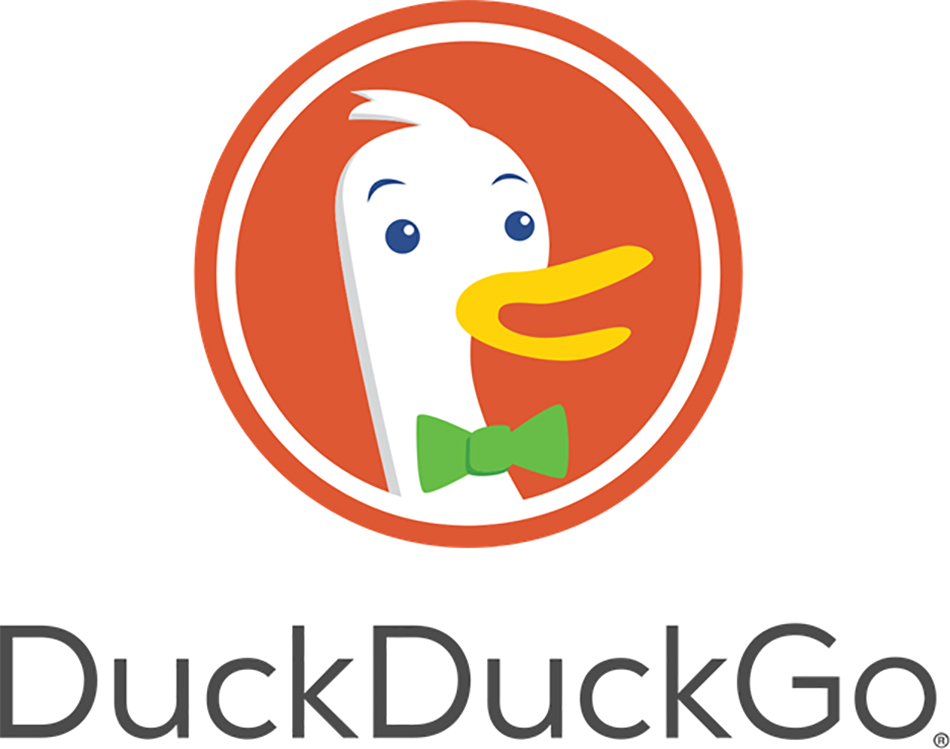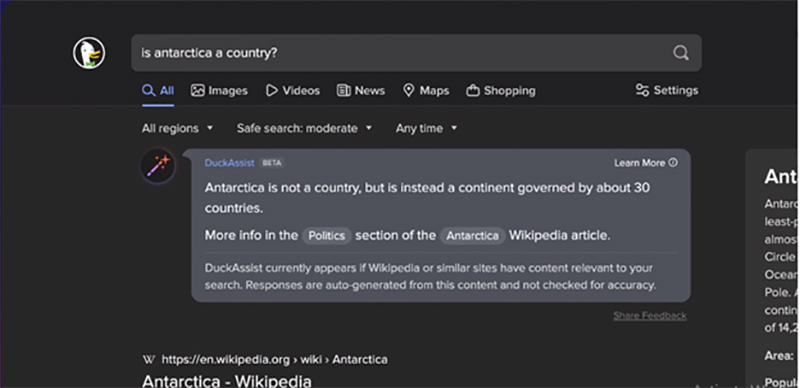DuckDuckGo Rides the AI Search Bandwagon

After Microsoft made a successful reintroduction of its Bing search engine with the help of ChatGPT and Google’s embarrassing Bard outing, another big search engine is dabbling with AI search. DuckDuckGo, the alternative search engine that focuses on privacy, recently announced the beta launch of its AI-powered search feature.
The feature is called DuckAssist. It is designed to provide straightforward answers for user queries. It is supposed to summarize the results of search results, but for now the sources of DuckAssist’s answers are still limited.
How DuckAssist generates AI search results
DuckAssist follows ChatGPT’s lead in taking advantage of generative AI. It employs natural language processing (NLP) technology made available by OpenAI and Anthropic to power its answer summarization function. OpenAI is the creator of ChatGPT, while Anthropic is a new AI company established by former employees of OpenAI.
In an interview with TechCrunch, DuckDuckGo founder Gabe Weinberg shared some details of the browser’s AI search function based on generative artificial intelligence. Weinberg explained that, at the moment, DuckAssist’s results are mostly from Wikipedia. Around 99% of the beta version’s output is from Wikipedia and other encyclopedic resources online.
However, there are plans to eventually expand the sourcing to various other websites and the content indexed by DuckDuckGo. News and current affairs queries, in particular, will have to be sourced from trusted news sites. DuckAssist’s AI search results are expected to evolve in sophistication and scope, but Weinberg did not mention schedules or timelines regarding this. Nothing is also mentioned if DuckDuckGo would be reaching out to major websites to forge partnerships on content sourcing.
Expanding Instant Answers
DuckDuckGo actually already has a feature called “Instant Answers,” which readily shows a quick answer to user queries. These are also referred to as zeroclickinfo, since they are designed to show users what they need without having to click further into the search results. However, this only works for certain kinds of searches. It is automatically activated whenever the browser encounters certain keywords or keyword phrases.
Similar to what Google provides, DuckDuckGo’s instant answers automatically show concise responses on top of all search results. For example, if a user searches for the answer to an arithmetic problem, the calculator is displayed along with the answer to the question. If a user asks for the time of the day or the date, the clock or calendar shows up.
The introduction of DuckAssist with its AI summarization feature, however, improves these instant answers. It expands the function to more kinds of queries, not only those that involve mathematical questions and commonly queried facts.
Also, with natural language processing technology, the answers generated by DuckAssist are made to sound like a human is giving the response. It does not simply display facts. The summarized answer appears as if another person is typing in the answer.
Accuracy and privacy challenges
Just like other AI tools, DuckAssist is far from perfect. It may also put out incorrect quick answers. After all, even today’s leading AI chatbot ChatGPT is still prone to providing incorrect answers. Notably, Stack Overflow decided to ban ChatGPT for producing wrong answers frequently.
Users should expect DuckAssist to not always be right. However, DuckDuckGo says that this accuracy challenge has been addressed by limiting the answer source to Wikipedia and other similar knowledge bases. Wikipedia itself is also not always accurate, but it can be a reliable source of information most of the time. Plus, Wikipedia is regularly updated by a multitude of users from different parts of the world.
Using Wikipedia and other similar encyclopedic sites reduces the possibility of the AI engine to produce messy and alarming responses, just like what ChatGPT did when it gave away someone’s number to join Signal. AI has been steadily advancing, but it is still far from becoming fully reliable, let alone perfect.
The question of privacy is particularly important, given how AI also users user inputs to improve its performance. Weinberg suggests that they are aware of the accuracy and privacy questions, that’s why they decided to limit the information sources for now. Doing so prevents DuckAssist from “hallucinating,” wherein it churns out incorrect answers or random incoherent information.
More importantly, DuckDuckgo guarantees that doing AI-powered searches with DuckAssist is anonymous and in complete alignment with DuckDuckGo’s privacy protection thrust. No information from users is shared with any third party application or service. Weinberg asserts that the information generated by user searches is not used to train the AI models of third party solutions.
Availability
DuckAssist is not yet available to all DuckDuckGo users. For now it may only be accessed through DuckDuckGo’s apps and browser extensions. It is not yet on the DuckDuckGo.com website. Also, for now DuckAssist is only for searches in the English language. It is free to use and does not require users to create accounts or log in.
The creators of this new AI search tool say that they intend to roll it out to more users, especially to web-based DuckDuckGo users, in the next few weeks.

